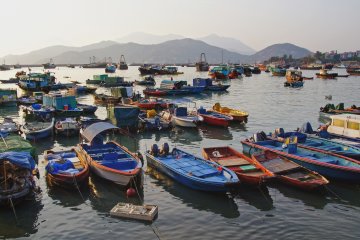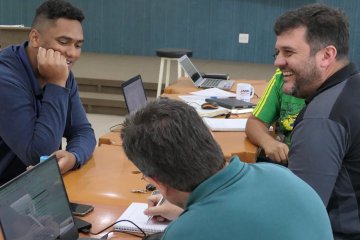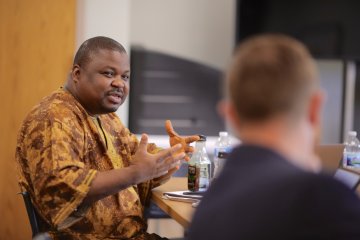Training to Pass the Baton
Training Leaders International (TLI) seeks to strengthen the global church by investing in its leaders through theological education. Our non-formal training typically happens in three-year cycles. Before launching a site, we partner with a local leader who will oversee the training and mentor nearby pastors. Then, during the first cycle, we send trainers to teach nine courses. If relaunching for a second cycle, we aim for graduates from the first cohort to teach alongside our trainers. After two cycles, we pass the baton to indigenous leaders. Training then becomes fully indigenous—our ultimate goal.
Sending Trainers
In 2005, while Fikadu Endale served as a pastor in Addis Ababa within the Ethiopian Addis Kidan Baptist Church network (EAKBC), a young animist named Gitacho inquired about a job. Fikadu hired him to be the church watchman. Gitacho soon became a disciple of Christ. And the church eventually sent him as a missionary to his hometown. Within twelve years, the church he planted has planted others, which have planted others. The result is more than forty EAKBC churches. Meanwhile, Fikadu has become an evangelist within the EAKBC network.
Men like Fikadu and Gitacho are ideal partners for a training site. They are respected, visionary leaders burdened for pastors in their country and connected with leaders who lack theological training.
In 2017, Fikadu asked TLI to assist in training EAKBC pastors. "In many parts of Ethiopia, it's easy to get converts and plant churches. But it's very hard to get well-trained leaders," he wrote. "Therefore, it is hard to get quality churches." So in 2019, we launched a new training site in Ambo, Ethiopia. Serving as our national partners, Fikadu and Gitacho worked with other EAKBC leaders to select seventy-five local church leaders for the first cohort. Over three years, we will send teams to teach our nine-course curriculum to these eager men and women, equipping them with skills to understand and communicate the Bible.
“In many parts of Ethiopia, it's easy to get converts and plant churches. But it's very hard to get well-trained leaders”
Teaching Together
Three hundred fifty kilometers south of Ambo sits Hawassa, the capital of Ethiopia's Sidama region. For many years, Pastor Tesfaye Nenko Edema has toiled to bring leadership training to pastors within the Ethiopian Full-Gospel Believers' Church. Pastor Tesfaye echoes Fikadu's assessment of their context. "Leaders in Ethiopia have never been equipped or adequately trained for their positions," he says. "Two factors behind this were persecutions under the communist regime and the fast growth of the churches everywhere."
Since 2015, Pastor Tesfaye has helped TLI launch three training sites at strategic locations along Ethiopia's Rift Valley. The latest is in Shashamene. Demeke, Gidaju, Henok, and Orano—four graduates of the first Hawassa cohort—have been selected to mentor a new group of sixty. The four mentors not only teach alongside our trainers but also assist trainees between courses. For example, they keep them accountable and help them with assignments and reports. As cultural insiders who have gone through our program, the mentors are uniquely equipped for this essential role.
Tesfaye's vision and service have been crucial for the success of the three Rift Valley sites. And Demeke, Gidaju, Henok, and Orano are the kind of graduates we pray each three-year training cycle will produce. They are humble, selfless men who faithfully lead their homes and ministries and seek to strengthen their skills as they equip others. And teaching alongside them benefits our teams. They understand their culture and unique challenges facing churches in Ethiopia.
Passing the Baton
Known as "The Pearl of Africa," Uganda shines for its beauty and hospitality. A few miles outside the northern city of Gulu is a thriving pastoral training site started by a small network of Wisconsin churches and Four Corners Ministries (FCM). Their initial goal was to promote church planting in Uganda. But as work began, that vision came into focus. With a narrowed emphasis on pastoral training, the partnership invited TLI to help.
The first Gulu cohort launched in 2016 with forty pastors and church leaders. During the first three-year cycle, TLI teams and FCM staff observed Pastor Basco learning, serving, and leading in his cohort. Beginning in 2019, for the second three-year cycle, he and five others were asked to mentor and co-teach the new cohort. (In both Shashamene and Gulu, local mentors meet for several days of intensive training with TLI prior to the full cohort's gathering.)
In Gulu, only a year into the second three-year cycle, the need for a third cohort is already apparent. But FCM, our national partner, will oversee the third cohort on its own. After six fruitful years of partnering in pastoral training, we will officially pass the baton once the second cohort from Gulu graduates. TLI will remain available to help as needed, but local leaders like Pastor Basco can now carry on without us.
A Race with More and More Runners
The goal of strengthening the global church through theological training isn't proprietary. In fact, we need others to help us accomplish it. Trainees and mentors from all of our non-formal sites will run the next leg of the race. We want to crowd the track, passing the baton to many who are competent to faithfully preach and teach and equip others with skills to do likewise (2 Timothy 2:2).
“The goal of strengthening the global church through theological training isn't proprietary. In fact, we need others to help us accomplish it.”
One of TLI's oldest training sites is in Ghana. Its local leaders have caught this vision and understand the importance of solid training with a clear exit strategy. With each new cohort, two or three trainees are selected to co-teach a second cohort and take over in a third. TLI has passed the baton, and the Ghanaian leadership recently launched a fourth three-year training cycle. All of the pieces are now in place for Ghanaians to train new cohorts of pastors, to raise up and develop Ghanaian mentors who will teach alongside Ghanaian trainers, and to launch new sites led by indigenously-trained, Ghanaian teachers elsewhere in the country.



